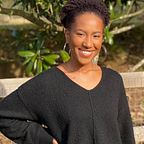Remembering Michael Brown and Ferguson, MO
After visiting St. Louis in 2017 through Howard’s Alternative Spring Break program and learning about its people and culture, I realized how much of what St. Louis has to offer out shadowed the tragic, yet significant, pieces of its history.
It was eye-opening to see a community that I was guilty of reducing to its lowest moment in a more nuanced light, but I couldn’t help but notice the various social institutions that provided context to Michael Brown’s murder in 2014 and a community’s failure to bring his killers to justice (again) in 2020. We visited and volunteered at an Urban League, a Boys and Girls Club, a juvenile detention center, and the high school Mike Brown graduated from. I still follow some of the kids we met there on Snapchat. I talked with one girl a few months ago about the possibility of Howard students returning to St. Louis.
At Normandy High School we met their librarian who talked about their catalog lacking representation for the majority Black student body, which inspired Better to Speak’s first-ever initiative, The Book Drive. Whenever I tell this story I always say that it surprised me that it was a white woman who noticed this and not only called it out but who was actively working to improve the representation in their literature. Classroom library diversity remains the cornerstone of Better to Speak’s mission, but whenever I reflect on my experience in St. Louis and especially today on the sixth anniversary of Michael’s murder I realize there’s so much more to our stories — more to Black liberation — than visual representation.
Although I left inspired to give back directly to the community I was most connected to in D.C., memories of the St. Louis we left behind still stuck with me. I was able to go back to my college town after a week motivated, and charged to take action. The community we left behind was, at the time, struggling to elect its first Black mayor (a feat it has since achieved with Ella Jones) and otherwise had glaringly disparate conditions for Black residents.
What I took from that was not to look at Michael Brown’s murder as a single, isolated incident, nor was my conclusion to pity the people of Ferguson — people who, just like the rest of us, are working to survive and thrive under white supremacist systems. I’ve since realized the gravity with which these disparate conditions exist for Black folks in many cities across the United States. Ferguson only painted a clearer picture of all the various social components that work together to catalyze systemic oppression for Black people including the incidents like what we saw with Michael Brown in 2014 and now with George Floyd in Minneapolis and Breonna Taylor in Louisville.
This has brought me to conclude a few things: To call for the arrest of killer cops demands that we depend on the very systems we are seeking to delegitimize or dismantle altogether. To call for the end of the myriad modes of criminalizing Black folks requires that we have systems of support in place to actually take care of people, not force them into livelihoods of survival only to criminalize said livelihoods. It demands that society sees Black folks as full human beings who do not need to be policed. It demands that we examine every facet of society and shed light on its darkest parts — the parts that make us deeply uncomfortable with how embedded white supremacy is into each of those facets of society and move us to unlearn the ways in which it is embedded into our own beings.
As I continue to reflect on this day six years ago (even moreso the uprisings that took place afterward) and everything going on in the world today I feel and increasingly loud invitation for us all to seriously reimagine what this world and its social systems could look like altogether. At this point, justice for me looks like the abolition of every system that fails Black people each and every day, and the resurrection of a world that simply doesn’t harm us to begin with, instead of one that applauds our resiliency in spite of its harm. I want a world that wants to see Black folks living and thriving instead of begging each and every day for our lives to matter and our humanity to be acknowledged.
I’m tired of posting hashtags and celebrating death anniversaries without justice and rattling off an endless list of names of those we’ve lost — I just want a world that wants to see Black folks living and thriving.
